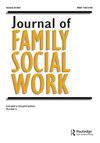在寄养中使用智能手机技术建立关系能力:照顾者的声音和谨慎育儿的启示
IF 0.7
Q3 SOCIAL WORK
引用次数: 8
摘要
越来越多的儿童福利项目被鼓励考虑技术如何帮助实现儿童保护、永久性和福祉的目标。本研究采用质性调查的方法,探讨照顾者(亲生父母、养父母、亲属照顾者)对寄养青少年使用智能手机促进关系能力(幸福指标)的看法。关于使用智能手机技术促进与适当成年人建立健康、积极联系的可行性,实施研究(过程和满意度评估)得出了不同的结果。虽然寄养青少年对这项技术使他们建立关系和建立联系的方式非常满意,但照顾者报告说,手机本身以及机构的规则和限制篡夺了他们作为父母的权力和责任。寄养青年报告了与他人建立关系方面的收益,但照顾者认为智能手机的获得,作为一种干预方法,损害了他们与青年的关系以及青年与他人的关系。看护人还认为,寄养青年和他们的工作人员之间的关系不一定会因为使用智能手机而得到改善。讨论了有关使用智能手机技术的保障措施和建议,特别是与谨慎育儿有关的建议。本文章由计算机程序翻译,如有差异,请以英文原文为准。
Use of smartphone technology in foster care to build relational competence: voices of caregivers and implications for prudent parenting
ABSTRACT Increasingly, child welfare programs are encouraged to consider how technology can help meet the goals of child protection, permanency, and well-being. Qualitative inquiry was used in this study to explore caregivers’ (biological parents, foster parents, kinship caregivers) perceptions of the use of smartphones to facilitate relational competence (an indicator of well-being) in foster youth. The implementation study (process and satisfaction evaluations) yielded mixed results concerning the viability of using smartphone technology to facilitate healthy, positive connections with appropriate adults. Although foster youth were highly satisfied with how this technology enabled them to forge relationships and establish connections, caregivers reported that the phone itself and the agency’s rules and restrictions usurped their parental authority and responsibility. Foster youth reported gains with respect to relationship building with others, but caregivers felt the acquisition of smartphones, as a method of intervention, compromised their relationship with the youth and the youths’ relationship with others. Caregivers also felt relations between foster youth and their workers were not necessarily enhanced via smartphone usage. Safeguards and recommendations concerning the use of smartphone technology, especially pertaining to prudent parenting, are discussed.
求助全文
通过发布文献求助,成功后即可免费获取论文全文。
去求助
来源期刊

Journal of Family Social Work
SOCIAL WORK-
CiteScore
2.10
自引率
0.00%
发文量
4
期刊介绍:
Each issue of the Journal of Family Social Work contains peer reviewed research articles, conceptual and practice articles, creative works, letters to the editor, and book reviews devoted to innovative family theory and practice subjects. In celebrating social workers" tradition of working with couples and families in their life context, the Journal of Family Social Work features articles which advance the capacity of practitioners to integrate research, theory building, and practice wisdom into their services to families. It is a journal of policy, clinical practice, and research directed to the needs of social workers working with couples and families.
 求助内容:
求助内容: 应助结果提醒方式:
应助结果提醒方式:


